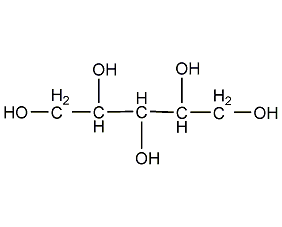
Structural formula
| Business number | 01YU |
|---|---|
| Molecular formula | C5H12O5 |
| Molecular weight | 152.15 |
| label |
1,2,3,4,5-pentanol, Pentahydroxypentane, pentapentanol, Xylite, sweetener, Aliphatic alcohols, ethers and their derivatives, organic insulating materials |
Numbering system
CAS number:87-99-0
MDL number:MFCD00064292
EINECS number:201-788-0
RTECS number:ZF0800000
BRN number:1720523
PubChem number:24902140
Physical property data
1. Properties: white crystal or crystalline powder, sweet, and the sweetness is equivalent to sucrose.
2. Density (g/mL, 25/4℃): 1.52
3. Relative vapor density (g/mL, air=1): Undetermined
4. Melting point (ºC): 92~96
5. Boiling point (ºC, normal pressure): 216
6. Boiling point (ºC, 5.2kPa): Undetermined
7. Refractive index: Undetermined
8. Flash point (ºC): Undetermined
9. Specific rotation (º): Undetermined
10. Autoignition point or ignition temperature (ºC): Undetermined
11. Vapor pressure (kPa, 25ºC): Undetermined
12. Saturated vapor Pressure (kPa, 60ºC): Undetermined
13. Heat of combustion (KJ/mol): Undetermined
14. Critical temperature (ºC): Undetermined
15. Critical pressure (KPa): Undetermined
16. Log value of oil-water (octanol/water) partition coefficient: Undetermined
17. Explosion upper limit (%, V/V): Undetermined
18. Lower explosion limit (%, V/V): Undetermined
19. Solubility: Very soluble in water (about 160g/100ml ), slightly soluble in ethanol and methanol.
Toxicological data
1. Toxicity: LD50 (mouse, oral) 22g/kg (bw). DAI does not need to be regulated (FAO/WHO, 1994).
Ecological data
None yet
Molecular structure data
1. Molar refractive index: 32.76
2. Molar volume (cm3/mol): 99.7
3. Isotonic specific volume (90.2K ): 306.8
4. Surface tension (dyne/cm): 1.570
5. Polarizability (10-24cm3): 12.98
Compute chemical data
1. Reference value for hydrophobic parameter calculation (XlogP): -2.5
2. Number of hydrogen bond donors: 5
3. Number of hydrogen bond acceptors: 5
p>
4. Number of rotatable chemical bonds: 4
5. Number of tautomers:
6. Topological molecular polar surface area (TPSA): 101
p>
7. Number of heavy atoms: 10
8. Surface charge: 0
9. Complexity: 76.1
10. Number of isotope atoms : 0
11. Determine the number of atomic stereocenters: 2
12. Uncertain number of atomic stereocenters: 0
13. Determine the chemical bond positionsNumber of stereocenters: 0
14. Number of uncertain chemical bond stereocenters: 0
15. Number of covalent bond units: 1
Properties and stability
This product is an edible nutritional sweetener. It must be controlled to be pollution-free during production, storage and transportation, and the product must be strictly inspected.
Storage method
Solid products are packed in double-layer kraft paper bags lined with PE film or polyethylene Packed in a propylene woven bag lined with PE film, net weight 25kg/bag. Liquid products are packed in plastic barrels. Store in a cool, ventilated and dry place.
Synthesis method
1. Polypentanolide contained in agricultural product processing waste (such as corn cobs, cottonseed husks, sugarcane bagasse, rice husks, etc.) Sugar is acidically hydrolyzed into xylose, and after refining, it is hydrogenated in the presence of catalyst sodium amalgam to obtain crude xylitol, which is then concentrated, crystallized, and separated to obtain crystalline xylitol.

2.The polypentosose contained in agricultural products processing leftovers (such as corn cobs, cottonseed husks, sugarcane bagasse, rice husks, etc.) is acidically hydrolyzed into xylose. After refining, it is added in the presence of the catalyst sodium amalgam. Hydrogen is used to produce crude xylitol, which is then concentrated, crystallized, and separated to obtain crystalline xylitol.
Purpose
1. Organic synthetic raw materials can be used to produce surfactants, emulsifiers, demulsifiers, various alkyd resins, coatings, varnishes, etc. The esters produced with synthetic fatty acids are non-volatile plasticizers. Xylitol can replace glycerol and is used in papermaking, daily necessities and defense industries. Because it is a polyhydroxy compound, it has a sweet taste, is non-toxic, and is suitable for low-calorie foods and as a sweetener for diabetics. Xylitol can inhibit the formation of dental caries and promote the healing of dental caries. It can be made into oral products and gums.
2.It is a special sweetener with nutritional value. It dissolves in water and absorbs heat. It has a refreshing taste when eaten. It does not cause dental caries and is also suitable for diabetics. Our country stipulates that it can be used in pastries, beverages, and candies to replace sucrose and be used in appropriate amounts according to production needs.

 微信扫一扫打赏
微信扫一扫打赏

